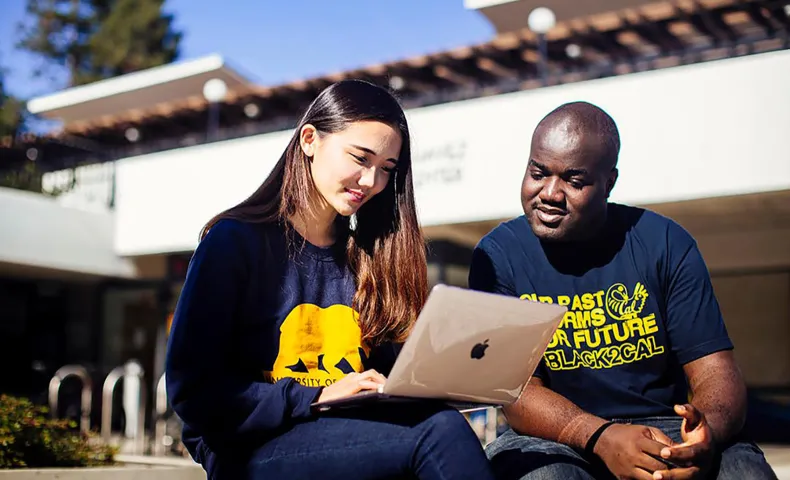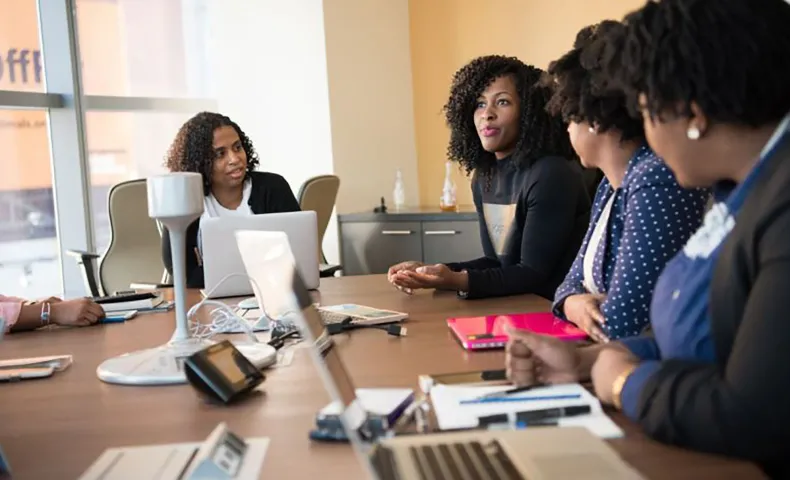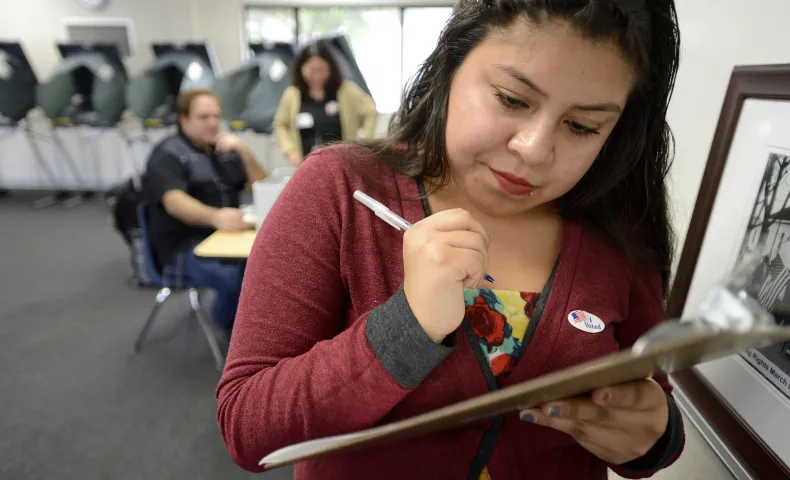California Immigrant Resilience Fund
Recognizing that undocumented immigrants and their families are at grave risk as a result of COVID-19, a collaborative of funders join together with the State of California in an effort to help.
Recognizing that undocumented immigrants and their families are at grave risk as a result of COVID-19, a collaborative of funders join together with the State of California in an effort to help.
The University of California, Berkeley, receives a $10 million grant from the Haas, Jr. Fund to create a more diverse, welcoming, and inclusive campus. A cornerstone of the gift is $2 million for scholarships designed to bolster the university’s African American student community and their overall campus experience.

Berkeley — The University of California, Berkeley is announcing today (Sept. 30, 2019) a significant step toward expanding diversity and access across the campus, thanks to a $10 million gift from the Evelyn and Walter Haas, Jr. Fund. Knowing that diversity, equity and inclusion are key to the university’s standing as a premier public institution, this investment supports a wide range of programs to transform the student population and create a more welcoming and inclusive campus.
A cornerstone of the gift is $2 million for scholarships designed to bolster the university’s African American student community and their overall campus experience. It is also a challenge contribution, which calls on additional donors to step forward so that the gift is fully leveraged at $4 million.
The African American Initiative Scholarship is a partnership of the San Francisco Foundation, the Cal Alumni Association, and the Haas, Jr. Fund. The scholarships are a valuable tool to help attract African American students who have been admitted to Berkeley but would otherwise choose to go elsewhere.
The gift will also support a variety of campus programs aimed at diversifying the student body and improving the experience of historically underrepresented students and includes several opportunities for donor contributions to be matched. In addition, it will boost efforts to:
Among the innovative programs to be supported by the investment is a series of bridging experiments led by UC Berkeley Professor of Law and Professor of African American Studies and Ethnic Studies john powell. These are designed to create life-changing experiences for students and expand practices that promote belonging, foster a more cohesive campus environment and prepare students for the 21st century.
“We are grateful to the Evelyn and Walter Haas, Jr. Fund for this remarkable gift, and our longstanding partnership, which will help us make important strides toward becoming a truly inclusive and welcoming campus for African American, Latinx, and Native American students,” said Chancellor Carol Christ. “These efforts embrace the California spirit and its diversity, befitting our tradition as an engine of social mobility.”
Chancellor Carol Christ last year announced the Undergraduate Student Diversity Project. The initiative intends to help students learn to thrive in a multicultural world and ensure that the university meets its responsibilities as a leading public university in an increasingly diverse state.
The gift from the Haas, Jr. Fund builds on its legacy of support for the university as a national leader in research, teaching and public service related to equity and inclusion. With this investment, giving by the Haas, Jr. Fund to UC Berkeley totals $72.5 million. In 2010, the foundation made a key $16 million gift to help launch a sweeping array of research projects, faculty chairs, scholarships, and courses that reached every corner of the campus.
For donors interested in giving to the African American Initiative Scholarship, please contact Brooke Hendrickson at +1 (510) 664-5191.
 Photo by BillMoyers.com
Photo by BillMoyers.com This report and executive summary was originally published on the Building Movement Project website.
This report applies an intersectional analysis to the data from the Building Movement Project (BMP) national survey of more than 4,000 nonprofit staff.
BMP’s research has already emphasized the need to address deeply embedded biases and systemic barriers that negatively impact the career advancement and experiences of people of color working in the nonprofit sector. By examining the impact of both race and gender on survey respondents, this report adds important nuance to the conclusions drawn from the other reports in the Race to Lead series.
Demographically, the Nonprofits, Leadership, and Race Survey sample primarily consists of women. The largest percentage of survey respondents were white women (46%), followed by women of color (32%). Men of color and white men were 9% and 10% of the sample, respectively. Transgender and gender non-conforming people of color (1%) and white people (2%) were the smallest share of participants. Black women comprised the largest portion of women of color respondents, followed by Latinx women, multiracial women, Asian/Pacific Islander women, and Native American women.
Although the survey data demonstrates that women of color face some barriers that are similar to those experienced by white women or men of color, the overlapping discrimination on the basis of race and gender places particularly acute burdens on many women of color. More specifically, the report details the following findings:
The report also explores key themes—based on survey write-in responses by women of color and from focus groups and interviews—among Asian/Pacific Islander, Black, Latinx, Native American, and transgender women of color.
Significant percentages of each group of women of color noted that both race and gender had a negative impact on their career advancement; most groups of women of color reported a negative impact of race or gender more often than white women, men of color, and white men. While the survey did not specifically ask respondents about the combination of both race and gender, several women brought up intersectionality in their write-in responses.
Many women of color in the nonprofit sector are highly skilled and want to lead, but the survey findings and focus group and interview reflections shared in this report identify significant obstacles and patterns of everyday discrimination that women of color encounter in the nonprofit workplace. Many women of color described working harder to overcome these barriers; not only is this an unfair burden, no amount of individual effort can be expected to translate into positive outcomes when an organization’s social landscape is fraught with bias. The nonprofit sector must make real changes to ensure a fair and supportive workplace environment for all workers, particularly for women of color.

Rockwood Leadership Institute, in partnership with the Evelyn and Walter Haas, Jr. Fund, announced today the launch of Resource Leaders, a new fellowship that will offer in-depth leadership development for senior fundraising professionals.
“Raising resources is central to an organization’s mission, whether it be strengthening communities or advancing social change. But few development directors have an opportunity to focus on their leadership development. Imagine the extraordinary impact that would be possible if development directors received the support they need to resource movements for equity and justice for our communities,” said Darlene Nipper, CEO of Rockwood Leadership Institute. “We are hopeful to see what these strong, focused leaders from powerful social change organizations will accomplish during their time as fellows in Resource Leaders and beyond.”
From a competitive pool of applicants, Rockwood selected 24 fellows who play core roles in raising resources for a range of social change organizations from across the country:
Bios of the 2018 cohort members are available here.
Raising resources for social change is essential to movement building, but because fundraising often is regarded as a support function, development staff rarely get the opportunity to focus on their leadership development. Development staff also often work in isolation, shouldering the responsibility for fundraising alone. Resource Leaders will provide participating development professionals with the space to think deeply about how their organizations can break out of chronic fundraising challenges, develop innovative ideas and fresh approaches to resourcing social change, and position themselves as strategic influencers and leaders within organizations and movements.
Participating fellows will get the tools and support they need to see themselves as changemakers in their own right, equipped to mobilize the people and resources that organizations need to transform communities for the better. Over the course of the year, including two, week-long residential retreats, the fellowship is designed to:
“Raising funds for social change is an essential part of social change work itself, not a sidebar,” said Rachel Baker, Director of Field Building at the Haas Leadership Initiatives. “We are honored to join forces with Rockwood to lift up this extraordinary cohort of development leaders and to support them in leading change within their organizations and beyond to resource social change.”
Get more information about Resource Leaders and the 2018 fellows »
Crissy Field opened to the public in 2001 as a beautiful National Park at the edge of the San Francisco Bay. Seventeen years later, it is a beloved destination for more than 15 million visitors each year.
A new video traces the past, present and future of Crissy Field, from its days as an active Army base to its rebirth as a public park. From the beginning, the Haas, Jr. Fund and its partners in the park’s restoration (including the Golden Gate National Parks Conservancy and the National Park Service) sought to make Crissy a park for all people, a place where anyone and everyone could recharge and connect with nature.
The video shines a light on two recent activities that showcase Crissy’s status as a beacon of inclusiveness. The first was a summer 2018 citizenship ceremony at Crissy where 32 young people from 17 nations officially marked the start of their American journey. Second, Crissy also was the summer home of another in a series of “StoryWalk”, an installation aimed at children. It included 52 panels situated throughout the park that told the illustrated story by Dave Eggers and Shawn Harris, Her Right Foot, about the Statue of Liberty.
In the video, Katherine Toy, Executive Vice President of Partnerships and Programs at the Golden Gate National Parks Conservancy reflects on Crissy’s future. She says the Conservancy and its partners are committed to making sure Crissy remains a truly inclusive public space.
“As we look to our future, we are really looking more and more toward questions about how we can welcome people to the parks so everyone feels not only that they’ve been invited, but they feel they belong.”
Katherine Toy
In March, the Haas, Jr. Fund officially welcomed three members of the third generation of the Haas, Jr. family to the Board of Directors: Elise Haas, Jesse Eisenhardt, and Walter A. Haas III.
In the wake of White House actions targeting refugees and immigrants, the Haas, Jr. Fund joins with other funders of immigrant rights to speak up for policies that advance diversity, inclusion and human dignity.
 Photo by Ed Crisostomo
Photo by Ed Crisostomo California’s demographics are changing fast, but rates of voting and civic participation haven’t kept up. In four rapidly growing counties across the state, a group of funders is working with local organizations to support diverse communities to lift up their voice and exercise their power on issues that affect their rights and their quality of life.
The work of the funders and their local partners is yielding important lessons as states and communities across the country begin to experience the dramatic demographic shifts that are transforming California. A new report, Bolder Together 2, documents key lessons for philanthropy from this work so far.
The report is a follow-up to a 2011 report that told the story of the funders’ early efforts. Now, after five years of grantmaking and intensive work in the four counties, California Civic Participation Funders tells a fuller story about how local organizations are coming together and working across issues to mobilize diverse communities to flex their democratic rights.
The funders also reflect further on how philanthropy can work with local communities to create a nation where government acts in the interests of all of the people.
Hundreds of students at U.C. Berkeley are undocumented Dreamers who came to the United States with their parents as young children. Meet a few of these students and hear their incredible stories, and learn firsthand how they are getting the services and the support they need to succeed at Cal and beyond with help from the Undocumented Students Program (USP).
USP is committed to supporting the advancement of undocumented students within higher education and promoting pathways for engaged scholarship. The program offers a network of support services to undocumented students, and is supported in part by the Haas, Jr. Fund.